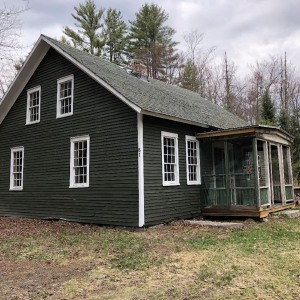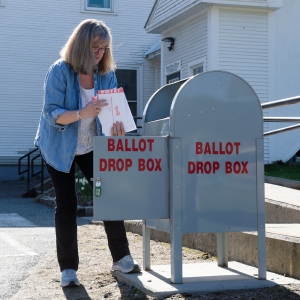Friends, family recall Norwich woman who died at Hanover Terrace nursing home
| Published: 04-08-2023 9:39 AM |
NORWICH — Mary Irene Moore, known as Irene, lived a quiet existence in Norwich before memory issues required that she move into a nursing home about a decade ago.
She first lived in the now-shuttered Brookside Health and Rehabilitation Center in White River Junction and then, when Brookside closed, she moved to Hanover Terrace Health and Rehabilitation Center on Lyme Road.
She was living there when she died at the age of 97 in January. Before her death, staff at the facility told her family that she had been bruised. It now appears she suffered much worse.
Earlier this year, a state medical examiner found that the January death of a Hanover Terrace resident was partially caused by unexplained injuries, including two dislocated shoulders and a fracture in the right one. Hanover Terrace was fined by federal regulators for several deficiencies discovered in January, including failing to prevent and properly report abuse. And while authorities have not identified the deceased residents, Moore’s family believes she was person referenced in the report.
Now, her nephew Bernie Moore has filed a request for a copy of the medical examiner’s report, which is considered a private document in New Hampshire. He also hopes to speak with the New Hampshire Attorney General’s Office, which is investigating Hanover Terrace and the circumstances surrounding the abuse regulators found there.
“I want somebody to be accountable,” Moore said. “...She was in a wheelchair. She should not have fallen. Somebody should have been there to witness it and I should have been notified.”
In the decades before her residence at nursing homes, Moore sold eyeglasses, cared for cats, watched birds, knit and spent time with friends.
She was a “smart, self-taught business person” as well as a “wonderful neighbor and a kind, caring individual with a heart of gold,” said George Fraser, whose family owns Dan & Whit’s in downtown Norwich.
Article continues after...
Yesterday's Most Read Articles
 Dartmouth administration faces fierce criticism over protest arrests
Dartmouth administration faces fierce criticism over protest arrests
 Hanover house added to New Hampshire Register of Historic Places
Hanover house added to New Hampshire Register of Historic Places
 Sharon voters turn back proposal to renovate school
Sharon voters turn back proposal to renovate school
Moore was born on Feb. 5, 1925, in Hanover to Dennis P. and Lucy (Hebert) Moore. She was the oldest of three. Her mother worked at the home, which would later become her daughter’s, and her father was a carpenter.
On Tuesdays, baking day, Lucy Moore made pies, bread with “butter not margarine” and donuts with lard from a family pig, said Bernie Moore, Irene Moore’s 70-year-old nephew who was her power of attorney at the end. His grandmother also kept a garden, canned produce, raised a cow for milk and chickens for eggs — “traditional stuff,” he said.
Irene Moore attended schools in Norwich and Hanover. Marion Cross, for whom Norwich’s elementary school is now named, was her teacher.
As a young person, Moore often could be seen walking around town. Her parents only allowed her to ride home with a couple of trusted families, and they forbid her from bike riding as it was “unladylike,” Fraser said. He remembers Moore walking home from Hanover High School while eating a pickled tripe — cow’s stomach — she had gotten at Tansey’s market, which was where Ledyard Bank is now. Other people enjoyed the sight, he said.
It was only after her parents, with whom she lived on Moore Lane about a mile from the center of town, died that she finally got her driver’s license, her friend Debby Van Arman recalled.
After graduating from high school, she took a job with American Optical in Hanover. When that business sold, she went to work for Dr. Eugene Clerkin in White River Junction. After he retired, she opened her own practice, Norwich Optical, which was between Dan & Whit’s and the bank in a 1983 advertisement in the Valley News that announced the business’ opening. She offered to fill prescriptions, or duplicate or fix glasses.
Moore rented her office space from the Frasers. She would put out cat food for the feral cats that lived off Main Street in Norwich at the time.
“She attracted way too many of them,” George Fraser said. “Some were neighbors’ cats who just liked the second feeding; some were strays.”
Overall, however, Moore was a “great tenant” and always paid her rent on time, Fraser said.
She also enjoyed watching birds. In her later years, before her memory declined, Bernie Moore, who lives in White River Junction, remembers his aunt sitting on a screened porch at her home, which she inherited from her parents, watching the birds at her feeders as she did a word search.
Van Arman described Moore as a “real crafts lady,” especially knitting. Fraser recalled her making mittens and hats to donate to an annual church bazaar.
Moore never married, but was like a member of the family to the Van Armans, Van Arman said.
“She and my mother grew up together,” Van Arman said. “They were like sisters.”
Moore joined the family for most holidays and attended the Van Arman childrens’ graduations. They considered her another grandmother figure.
“She was a part of the family celebrations always,” Van Arman said.
When Van Arman’s mother was dying, Moore brought food and came to sit with the family. Moore was a “wonderful, caring, loving friend,” Van Arman said.
A Catholic, Moore regularly carpooled with Van Arman’s husband, Jay, to St. Anthony’s Church in White River Junction for Sunday Mass. Moore also joined the family on various day trips over the years. They went to see Moore’s family plot in southern New Hampshire, and visited Van Arman relatives.
“She had such a quiet life,” Van Arman said. “A happy life.”
Her nephew and her friends said they were sorry to watch Moore’s decline at the end of her life.
In the “middle to later stages, she didn’t even know us at all,” Van Arman said. “It was really difficult for us to see that.”
Bernie Moore said he thought his aunt had gotten “pretty good care” at Brookside, which closed in 2017 after the Centers for Medicare and Medicaid Services declined to continue making payments to the White River Junction nursing home. In the years prior to the closing, the facility had been cited for a series of regulatory violations, including problems with food safety, low staffing levels, a gap in contracts between providers of rehabilitation services that left some residents without those services, and failing to ensure that patients saw their doctors regularly.
During her time at Hanover Terrace, Moore said he visited his aunt and got to know some of the other residents, whose dementia was less severe than Moore’s. On Saturday mornings, he said the facility held regular “get-togethers” in the dining room.
But during the COVID-19 pandemic and ongoing outbreaks at the facility it became more difficult to visit. Moore said calling ahead to schedule an appointment became “too much to deal with.”
Meanwhile, his aunt’s condition deteriorated and she became wheelchair bound; she was just a month away from her 98th birthday at the time of her death.
Had Moore not gotten a call from the New Hampshire medical examiner saying that the office would be conducting an autopsy, he wouldn’t have suspected that the bruising staff at the facility had alerted him to contributed to his aunt’s death, as a report compiled by investigators from the New Hampshire Department of Health and Human Services seems to indicate.
A report produced by state regulators in connection with the January death indicated that the facility on Lyme Road put residents in “immediate jeopardy” when it “failed to recognize, report, investigate, prevent and correct allegations of abuse and neglect”.
On Wednesday, Michael Garrity, a spokesman for the New Hampshire Department of Justice, confirmed that the department is investigating.
“This case is being looked into by our Medicaid Fraud Control Unit, which reviews complaints alleging abuse or neglect of patients in health care facilities,” Garrity wrote in an email. “Hanover Terrace is cooperating in the investigation as we work to interview current and former staff.”
In response to regulator’s findings, Hanover Terrace has made changes to its abuse policy, taken steps to improve reporting and is restricting the number of residents to match staffing levels.
Brendan Williams, CEO of the New Hampshire Health Care Association which includes nursing homes, said that citations of “immediate jeopardy” are “rare” in the state. While he acknowledged that staffing the facilities is difficult amid a health care workforce shortage, “their first priority must be ensuring quality care for their existing residents.”

 Plan on track to ship Upper Valley mail to Connecticut for sorting
Plan on track to ship Upper Valley mail to Connecticut for sorting West Lebanon crash
West Lebanon crash Over Easy: On bread, buttered popcorn and big sandwiches
Over Easy: On bread, buttered popcorn and big sandwiches
